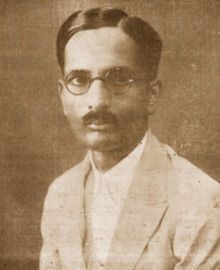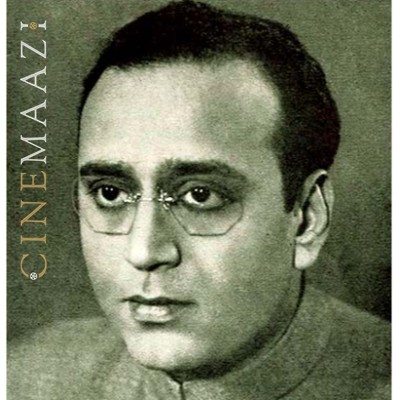Keshav Rao Bhole

Subscribe to read full article
This section is for paid subscribers only. Our subscription is only $37/- for one full year.
You get unlimited access to all paid section and features on the website with this subscription.
Not ready for a full subscription?
You can access this article for $2 , and have it saved to your account for one year.
- Born: 23 May, 1896 (Amravati)
- Died: 9 Nov, 1977 (Bombay)
- Primary Cinema: Marathi
Inspired by the Western orchestras that accompanied silent films, Keshavrao Bhole experimented successfully with orchestral compositions, adopting innovations by introducing piano, Hawaiian guitar, and violin. He thus gave a modern and cerebral outlook to music in the 30s. He first did so for the play Andhalyanchi Shala, which was staged in 1933 by the theatrical company he founded, Natya-Manvantara. Interestingly, the music in the play also tied the music to a fixed running time.
Born Keshav Vaman Bhole on 23 May, 1896 in Amravati, Maharashtra, he was a well-known music composer and critic in Indian cinema. Founder of theatrical company Natya-Manvantara, he went on to join Prabhat Film Company in 1933 as a music composer. Here, he replaced the more orthodox Govindrao Tembe, and went on to compose some of Prabhat’s best-known hits.
He provided music for Amrit Manthan (1934), a costume drama film directed by the studio’s owner, V. Shantaram for his Prabhat Film Company. Produced simultaneously in Hindi and Marathi, Amrit Manthan was based on Narayan Hari Apte's novel Bhagyashree, the Hindi translation of which was done by Veer Mohammed Puri, who also wrote the lyrics for the film. Revolving around the story of a reformist king who bans human and animal sacrifices, and a fanatical head priest who is willing to cut off his own head for a perfect sacrifice, the film was the first to run for more than 35 weeks, celebrating its silver jubilee. It also featured the first Hindi film ghazal Kamsini mein dil pe gham ka, which was rendered by Shanta Apte who also starred in the film. Under Bhole, the actors rehearsed to a score played live, tuning their performative rhythm to the music. Attention was also paid to choosing the scales to counterpoint the actors’ speaking voices.
Next, Bhole worked in Sant Tukaram (1936), based on the life of Tukaram, a well-loved Varkari saint and spiritual poet of the Bhakti movement in India. Directed by Vishnupant Govind Damle and Sheikh Fattelal, it became the first Indian film to receive international recognition. Adjudged one of the three best films of the world at the Venice Film Festival, it also broke box office records by being the first Indian film to run in a single theatre for more than a year. Becoming the archetype for devotional films, most of the songs were Tukaram's own verses, with the exception of one song by Shantaram Athavale. The music had a tremendous impact on the audience, with Bhole following the traditional music style of the Varkari sect. The result was innovative without sacrificing the traditional originality of the bhakti music. Experts believe Bhole’s impact on performance idioms is most evident in this film.
Kunku/Duniya Na Mane (1937) followed, a social classic on the empowerment of women, denounced the dowry menace and the evil custom of old men virtually buying young brides. Keshavrao’s music in the film includes popular songs by Shanta Apte such as Ek tha raja ek thi rani, Jai Ambe Gauri maiyya, and Yahan pe aake har ek apni nirali duniya bana raha hai. The film also featured an English song, a first, in ‘Let us then be up and doing’ based on a poem by H.W. Longfellow. Interestingly, background music in the film was eliminated, with only natural sounds used, such as a wooden ruler and metal utensils generating sounds for the songs. The instrumental music accompanying the songs was provided via the playing of gramophone records.
Bhole’s Sant Dnyaneshwar (1940) about the life of the 13th-century Marathi poet, philosopher, saint and yogi of the Nath tradition, is another winner. The film told the story of a boy who finds enlightenment by experiencing religious hypocrisy and dogmatism. He also scored the music for Das Baje/10 O'Clock (1940), made in Hindi and Marathi, about a love triangle that starts with a college romance and ends with a medical ethics dilemma. Ram Shastri (1944), Bhole’s next film, was based on the life of Ramshastri Prabhune, the judge who had to decide on Raghoba's culpability in Narayanrao Peshwa's murder.
Keshavrao Bhole was also a critic, writing under the pseudonyms 'Ekalavya' and 'Suddha Saranga'.After the film Das Baje, during 1943, Bhole along with other Prabhat regulars like Raja Nene, Shantaram Atavale, and Datta Dharmadhikari left Prabhat. He did complete composing the music of Ram Shastri before leaving Prabhat, and moving to join Mohan studios, and working independently. Some of his later work includes Taramati (1945), Kuber (1947), Bhagyarekha(1948) and Parijatak / Shri Krishna Satyabhama (1951).
Keshavrao Bhole passed away in 1967, age 71.








.jpg)



